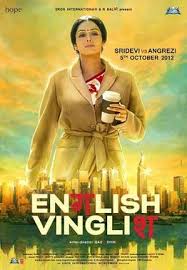English Vinglish

Safecity is reviewing films that are stepping out to highlight the innate gender roles, discrimination, stereotypes, sexual harassment, misogyny and sexism which have been an ingrained part of cinema for a long time through our blog series “Feminism in Reel Life”authored by Ishmeet Nagpal.
A dentist turned social activist, Dr. Ishmeet Nagpal has been working for women’s health and gender rights for 4 years in different parts of India. Currently in Mumbai, she works with students and journalists, on issues of gender identity and gender perceptions, as well as sexual harassment at the workplace.
English Vinglish: Recognizing a Woman’s Unpaid Labour of Love
English Vinglish is a movie that touched many hearts and won many accolades, a movie that revolved around an unlikely hero- the uncelebrated housewife- and her quest of self love.
Shashi (played by Sridevi) considers her family as her whole world and keeps looking for validation and respect from the people whom she loves most, only to be disappointed by their habitual ridiculing of her inability to speak English well. The seemingly insignificant slights may not seem like a burning tragedy, but the movie helps us understand how deeply it can affect someone to not be acknowledged by their family.
Shashi works tirelessly to keep her family happy, sometimes even thinking that they love her because of her ability to make delicious food for them. Her self worth plummets with each taunt and ‘good-natured’ ribbing from her husband and daughter, making it difficult for her to see her own strength as she manages a home and runs around the city managing her very own laddoo business. In fact it’s not until she enrols in an English speaking class in New York that she recognizes herself as an entrepreneur. Her niece and her classmates help her to see herself as the beautiful person she is, by complimenting her wit, her grit, her passion for cooking, and her intellect, qualities she didn’t have a chance to commend herself for before.
Shashi beautifully articulates a deep rooted patriarchal mindset that leads us to believe that when women cook it is just a part of their daily tasks and a duty, but when a man cooks, it is art, it’s a profession. If we ever sit down to think about the unpaid labour women put into their homes, and compare it with the costs of hiring professional services for each of those tasks, I’m sure many of us would see homemakers in quite a different light. But then, could we ever replace the love, care and nurturing a woman provides her family? This emotional labour is certainly priceless.
English Vinglish teaches us to treat our fellow humans with more empathy. Shashi’s husband is a loving partner, yet devalues her achievements and confidence at every turn, maybe out of a reflexive thought process that has taught him to measure accomplishment in terms of visible monetary worth and patriarchal notions. Her mobility is questioned when he realizes she doesn’t need him to navigate a strange country on her own. He resents her being able to enjoy her own company and guilts her into putting her family’s concerns before her own aspirations.
Of course, it all comes right in the end, with a deeply meaningful speech by Shashi where she declares that a marriage can exist only when the partners respect each other and themselves, and her husband is jolted into looking at her with a changed perspective. For Shashi, a marriage can only exist between equals, and sometimes, this equality may be just within reach.
Opinions expressed are of the writer.


